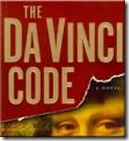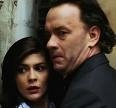A few days ago, I saw this announcement on Shelf Awareness:
The Lost Symbol, Dan Brown’s long-anticipated follow-up to The Da Vinci Code, will be published September 15 by Knopf Doubleday. A first printing of five million copies is planned for the book. The New York Times noted that “fans and the publisher have been waiting a long time for Mr. Brown to finish the new book. It was originally scheduled for a 2005 delivery. The Lost Symbol will again feature Robert Langdon, the protagonist of The Da Vinci Code.”
At long last, a little more than six years after the publication of The Da Vinci Code, Brown is back. “Waiting a long time” is understating it a bit, don’t you think?
I remember first hearing about the next installment in the series shortly after DVC sales rocketed into the stratosphere. The story (last I heard) was to be set in Washington DC, involving the founding fathers and the Freemasons (can you just imagine the expression on Brown’s face when the film National Treasure came out?)
 And then the years passed…and as they did, to be honest, I started to feel for the guy.
And then the years passed…and as they did, to be honest, I started to feel for the guy.
Granted, he’s insanely wealthy and successful, one of those few among us who became a household name. He managed to write a thriller that captured the public imagination so completely, there are actually plaques mounted on famous Parisian landmarks rebutting some of the claims in the book (it’s fiction, people. Fiction). And sure, without ever penning another sentence he could still probably buy an island in Fiji every year without worrying about eating dog food in his dotage.
But just for a second, put all that aside. Imagine the pressure. Brown could not possibly have known how successful his book would become (sure, he probably hoped–let’s be honest, we all hope. In my dreams I’ve whiled away many an hour on Oprah’s couch). And when it became the bestselling novel of all time, spawning a torrent not just of similar thrillers but tie-in products and books, charter tours, specials on the History Channel, a film with a horribly miscast Tom Hanks wearing what appears to be an otter on his head…wow. Sure, he’s no longer under the same deadline pressure as the rest of us, his editor isn’t sending nasty emails asking where the draft is (although I’m guessing some fairly pleading/begging missives have passed between them). 
But how do you follow up on that level of success? You know the critics are out there, sharpening their knives. The fans have huge expectations, and a significant number of them are bound to be disappointed. And with every passing year, those knives have just gotten sharper.
For the past few years I’ve envisioned Dan Brown holed up somewhere, naked and filthy à la Howard Hughes, pacing and muttering to himself while a laptop blinks relentlessly from a dark corner. Typing a chapter, erasing it the next day. Worrying over every plot twist, every word choice. After all, deep down nearly every writer is a bundle of insecurity; it’s impossible to have distance from your own work, and I’m guessing we’ve all had that, “this is the worst crap ever written” moment as we review our latest manuscript.
Would the stress be worth it?
Hell, yeah.
But come September 15th, I figure Brown will be sitting alone somewhere, drink in his hand, heart pounding, stomach churning, waiting for the verdict. And I’ll most likely be sitting somewhere else, responding to a chiding email about a missed deadline. And I’ll feel a little sorry for him. Then I’ll pick up a copy of The Lost Symbol, snort, and say, “Not nearly as good as his last book.”
On principle. You know.
~~~~~~~~~~~~~~~~
Coming up on our Kill Zone Guest Sundays, watch for blogs from Sandra Brown, Steve Berry, Robert Liparulo, Paul Kemprecos, Linda Fairstein, Tim Maleeny, Oline Cogdill, Alexandra Sokoloff, James Scott Bell, and more.
